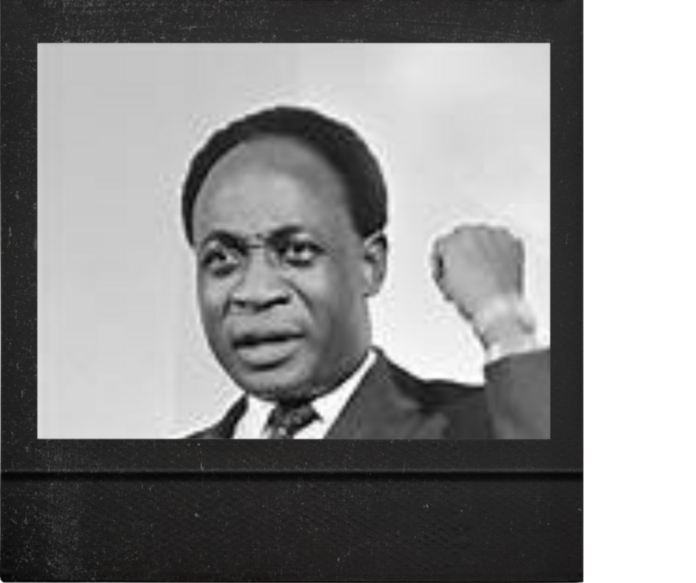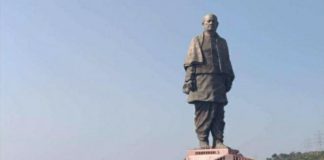Kwame Nkrumah, the first prime minister (1957-1960) and president (1960-1966) of the Republic of Ghana, was the leader of the first sub-Saharan African nation to gain its independence. He subsequently became a leading figure in the campaign for the United States of Africa. On September 21, 1909, Nkrumah was born in Nkroful, Gold Coast. The son of a goldsmith, he attended mission schools at Accra and government training colleges at Achimota (1926-1930) where he prepared to be a teacher.
In 1935, Nkrumah left for the United States where he attended Lincoln University (1935-1939) and the University of Pennsylvania (1939-1943). A gifted student, by 1943 Nkrumah had earned multiple bachelor’s and master’s degrees in economics, sociology, education, theology, and philosophy. Then, in May of 1945, Nkrumah departed for London, England, where he studied as a PhD student at the London School of Economics. While in London, Nkrumah held key positions in anti-colonialist and black-nationalist organizations and authored controversial papers calling for African independence and unity. In 1945, Nkrumah co-founded the Pan African Congress, which became an influential voice against colonialism in Africa.
In 1947, Nkrumah returned to the Gold Coast and became general secretary of the newly-founded United Gold Coast Convention. However, in 1949 Nkrumah split with the organization over its political objectives and formed the Convention People’s Party (CPP). During his tenure as head of the CPP, Nkrumah protested British rule and led numerous petitions for self-government. Imprisoned by the British in 1950 for his political activities, Nkrumah was released in 1951 when his party won the general election in a landslide victory. He subsequently was elected prime minister in 1952.
As prime minister, Nkrumah led an aggressive campaign for independence and achieved it in 1957. Three years later, he formed a new government, the Republic of Ghana. A devoted Pan-Africanist, Nkrumah forged alliances with both Guinea and Mali and sought to create a league of African states with its government. To help achieve this goal, in 1963 he and other African leaders formed the Organization of African Unity. Choosing to remain neutral in political affairs outside of the African continent, Nkrumah initially gained tentative support from both the United States and the Soviet Union, receiving economic and technical aid from both countries.
Vigorously suppressing political dissidents, Nkrumah almost immediately was branded a dictator by his political opponents. Then, in 1961 a firestorm of protest erupted after he appointed himself supreme commander of the armed forces and absolute head of the CPP. Nkrumah subsequently outlawed all other political parties.
In 1966, Nkrumah’s government was overthrown by a coup d’état while he was on a trip to Beijing, China. Taking refuge in Guinea, Nkrumah spent the rest of his life in exile. To say a few about his achievements,
Education Sector
Senior High Schools:
Under the Ghana Education Trust policy, Dr Kwame Nkrumah built several Senior Secondary (High) Schools including Mfantsiman Girls’ Secondary School, Ghana National College of Cape Coast, Ofori Panyin Secondary School, Techiman Secondary School, Winneba Secondary School, Swedru Secondary School, Apam Secondary School, Dormaa Secondary School, Tema Secondary School, Oda Secondary School, and the Labone Secondary School.
Colleges of Education:
Dr Kwame Nkrumah also built Colleges of Education including Kwadaso College of Education, Atebubu Training College, Berekum Training College, Fosu Training College and the Enchi Training College.
Universities and Technical Institutes:
Dr Kwame Nkrumah, during his presidency, made the University of Ghana (then University College of Gold Coast affiliated to the University of London) a full-fledged university to award its degrees and became its first chancellor.
He also built the University of Cape Coast (UCC), Kwame Nkrumah University of Science and Technology (KNUST), Institute of African Studies, Kwame Nkrumah Institute of Economics and Political Science (now the south campus of UEW), Ajumako School of Languages (now under UEW), Kumasi Technical Institute (now a University) and Accra Polytechnic (now Accra Technical University).
Health Sector
Dr Kwame Nkrumah built the Komfo Anokye Teaching Hospital (previously Kumasi central hospital).
He made Korle Bu a teaching hospital and expanded its capacity by constructing the Medical, Maternity, Surgical and Child Health blocks.
He established the Ghana Medical School.
He made Medical care free to all citizens.
He established GIHOC pharmaceuticals.
He also built several hospitals and clinics.
Factories and Industries
Dr Kwame Nkrumah built the following factories and industries. Most of them are no more in operation.
Abosso Glass Factory
Zuarungu Meat Factory
Wenchi Tomato Factory
Kade Match Factory
Akosombo Textiles Limited
Kumasi Shoe Factory
Plug Tomato Factory
Asutuare Sugar Factory
Komenda Sugar Factory
Kumasi Jute Factory
Nsawam Cannery, Brick and Tile Factory
Tarkwa Bonsa Tyre Factory
Bolgatanga Meat Processing Factory
Bolgatanga Rice Mill Factory
GIHOC Fibre Products Company, etc.
State Owned Enterprises and Companies
Dr Kwame Nkrumah built the following state companies. Some of them are no more in operation.
Ghana Black Star Line with almost 15 ships
Bank of Ghana (BoG)
Ghana Commercial Bank (GCB)
Agricultural Development Bank (ADB)
National Investment Bank (NIB)
State Insurance Company (SIC)
Social Security and National Insurance Trust (SSNIT)
Ghana Oil Company (GOIL)
Ghana Ports and Harbours Authority (GHAPOHA)
Tema Oil Refinery (TOR)
The National Management and Productivity Institute
Ghana Film Industries, Accra
Ghana Airways Corporation
Ghana National Trading Corporation
Cocoa Marketing Board (COCOBOD)
Tema Steel Works
VALCO
State Housing and Hotel Projects
Other key projects
Ghana Museums
Ghana Film Corporation
Ghana News Agency
Ghana Broadcasting Corporation
Atomic Reactor Station
Akosombo Dam
Restructured the British Military base into Accra (now Kotoka) International Airport.
Tema Motorway
Tema Harbour
Adomi Bridge
State Farms and Institutes
Exile, death, tributes and legacy
Kwame Nkrumah’s grave inside the Kwame Nkrumah memorial in Accra Nkrumah never returned to Ghana, but he continued to push for his vision of African unity. He lived in exile in Conakry, Guinea, as the guest of President Ahmed Sékou Touré, who made him honorary co-president of the country. When his cook died mysteriously, he feared that someone would poison him, and began hoarding food in his room. He suspected that foreign agents were going through his mail, and lived in constant fear of abduction and assassination. In failing health, he flew to Bucharest, Romania, for medical treatment in August 1971. He died of prostate cancer in April 1972 at the age of 62 while in Romania.
Nkrumah was buried in a tomb in the village of his birth, Nkroful, Ghana. While the tomb remains in Nkroful, his remains were transferred to a large national memorial tomb and park in Accra, Ghana.
Over his lifetime, Nkrumah was awarded honorary doctorates by many universities including Lincoln University (Pennsylvania), Moscow State University (USSR), Cairo University (Egypt), Jagiellonian University (Poland), and Humboldt University (East Germany).
In 2000, he was voted African Man of the Millennium by listeners to the BBC World Service, is described by the BBC as a “Hero of Independence”, and an “International symbol of freedom as the leader of the first black African country to shake off the chains of colonial rule.”
According to intelligence documents released by the U.S. Department of State’s Office of the Historian, “Nkrumah was doing more to undermine [U.S. government] interests than any other black African.”










